#Myanmar violence
Explore tagged Tumblr posts
Text
14 notes
·
View notes
Text
World on Fire
By Raj Chauhan
According to the ACLED index, 50 Countries in the world are either currently at war or debilitated by ongoing violence at the beginning of 2024. 1 out of 6 humans is exposed to armed conflicts in one way or another and what's most concerning is the level of violence worldwide has been steadily increasing in the past few years. 2023 witnessed, a 12% increase in unrest over 2022, and a 20% increase over 2019. Most of us are acutely aware of two main conflicts going on at the moment the war between Russia and Ukraine and the conflict between Israel and Hamas in Gaza.

But the media doesn’t give much coverage to conflicts in many other parts of the globe. So much of the blood continues with little attention. The truth is much more is going on than you probably realize and diplomatic tensions international conflicts and civil wars have continued to heat up in the past few months.
In this piece of work, we will go over as many ongoing conflicts as possible and uncover many ill-known strategies of the world and as we move ahead we will discuss less and less known wars that the media fails to cover.
So, arguably the third most well-known conflict is between Armenia and Azerbaijan, over the Nagorno-Karabakh region, since the days of the Soviet Union, both countries were part of Russia has long acted as the mediator between these two small countries but Russia’s attention now elsewhere the delicate balance has been offended, despite US efforts to mediate in June last year, the self-proclaimed Republic of Asdac, ruled by the Armenian majority enclave of Nagorno-Karabakh, since the 1990s which is surrounded by the Azerbaijan. Russia's peacekeepers have protected the Lachin Corridor a vital route for supplies like food and medicines flowing from Armenia but after they left Azerbaijan took advantage and blockaded the corridor in December 2022 causing severe shortages.
On September 19th, 2023 Azerbaijan sent as many as 1,00,000 troopers to invade the Nagorno-Karabakh region. In 24 hours, Azerbaijan troopers completely took over it and Asdac officially seized to exist on January 1st, 2024 with Armenia weakened and threatened by neighbouring Turkey and abandoned by its international allies. Azerbaijan remains officially at war with the country, and fear that the situation could explode soon as Azerbaijan started demanding a corridor through Armenia to connect the exclave of Nakhchivan to the rest of the country.
However, a little farther to the east lies one of the longest ongoing border disputes in the recent history between the recent history between the ex-Soviet Republic of Tajikistan and Kyrgyzstan. The news surfaced worldwide in September 2022 when reputed media reported on lives lost in the conflict.
Kyrgyzstan-Tajiskistan border clashes claim nearly 100 lives.
-BBC
24 were Killed on the Kyrgyzstan-Tajikistan border in the latest fighting to hit the former Soviet Union.
-CNN
The new casualties along the border led to the fear of spiralling instability now that Russia, which is now distracted could no longer mediate the dispute the conflict continues to claim occasional victims with intermittent skirmishes but Turkey has stepped in to try and negotiate a border agreement deal between the two countries.
Now let us move to Africa where regional instability in the eastern part of the Democratic Republic of the Congo threatens to become a regional conflict. Between 2022 and 2023, a dangerous political crisis spilled over the border into neighbouring Rwanda. Over the past decade, the ethnic Tutsi rebels in the east of the country formed a rebel military group against the national government in June. North Kivu region – M23 movement.
In June 2022, the Congolese government accused neighbouring Rwanda of backing rebels which was later confirmed true by UN experts. The situation has led to a border crisis between the Democratic Republic of the Congo and Rwanda in 2024 and the situation continues to deteriorate rapidly after Burundi accused Rwanda of actually training rebels of the same ‘Red Tobara Movement’ that tried to overthrow the Burundian government in 2015. Many fear the war will spread into the greater East African Region.
Another potential International war could break out between Venezuela and Guyana after Venezuelans voted to claim a huge chunk of Guyana's territory and send troops to the border war is not always a conflict between two nations, you see civil wars are happening in all different parts of the world. Yemen has been involved in a brutal civil war since 2014, between the Saudi-backed government coalition and Iran-backed Houthis rebels. The situation is already dire enough with as much as 75% of the population left in need of humanitarian aid and close to half of the Yemens population currently facing the risk of starvation due to the ongoing conflict. Right now the country is sparsely controlled by a handful of different factions beyond the Houthis rebels controlling the capital ‘Sanaa’ and all of the former North Yemen except the Eastern Marib Government, and the official government controlling much of the Eastern side of the country. Jihadist groups are taking advantage of local dire situations here and there. In addition to that the STC otherwise known as the Southern Transitional Council Movement is profiting from the support of UAE to seize control over to power the southern portion of the country to claim its independence pretty much like Yemen was split before it united in 1990. Yemen Civil war has yet again made news as ‘Houthis’ have been firing rockets across the Middle East against Israel in retaliation for the military operation against ‘Hamas’. This is contributing to the disruptions to global trade in the focal point of the ‘Bab el Mandeb Strait’ forcing cargo ships around Africa to deliver goods to Europe in Response, Western forces like the US and the UK have summoned attacks on the Houthi military targets.
Another civil war is carried on in Myanmar, where the military Junta returned to power in a Brutal Coup in 2021. The situation heated up in October 2023, when the different rebel factions brokered a deal to unite against the military government in a Joint offensive operation that has now displaced more than 3,50,000 people from their homes.
Moving back to Africa to a small country of Cameroon has also suffered a Civil War since 2016 when separatist from the Ambazonia Region declared their independence. If we look into Cameroon’s history it was once split into French and British colonies. The result is that the Amabazonia region is English-speaking while the rest of the country speaks French. This crisis is called the Anglophone War as the English-speaking minority fights against the wealthier and more powerful Francophone majority.
Elsewhere on the continent (Africa) Sudan is being torn apart by civil war, where military factions ripped open old wounds when they staged a coup in 2021. The United Nations is seriously concerned about the stability of the country as millions of people have been displaced to refugee camps and growing clashes threatened to spill over into South Sudan which gained its independence from Sudan in 2011.
Perhaps one of the worst situations in Africa is currently in Ethiopia's ‘Tigray’ region (North). Already one of the poorest areas of the country Tigray is scared by poor conflicts that led to the independence of the Eritrea region in the 1990s. The war with Eritrea left a strong Ethiopian military presence in the Tigray region which is home to the Tigrain people who have long enjoyed a degree of autonomy. However, the tide changed in 2021, when the current prime minister Abiy Ahmed’s Prosperity Party gained a large majority in the European Parliament and called for more centralization of power. Tigray’s subsequent rebellion was severely repressed. Pushing three and a half million people or more than half of its population to the brink of starvation tension already came to a boiling point in November 2020 when the Ethiopian Federal force invaded the Tigray capital Nekelle. They installed an interim government after the previous administration authorized new parliamentary elections despite a ban by Prime Minister Abiy due to the pandemic. More recently Abiy Ahmed has decided to divert international attention from Tigray by threatening neighbour Eritrea to six years after the last standing peace deal between the two countries which had earned him a Nobel Peace Prize. The issue at hand is Eritrea’s independence which made Ethiopia a landlocked country denying it access to the global trade opportunities of the Red Sea. Ethiopia is now threatening to regain Red Sea access by force for the time being Ethiopia seeking to establish a port in the neighbouring Somaliland a de-facto independent region of Somalia. If this idea is successful war could spread to the entire ‘Horn of Africa’ and beyond as Ethiopia is promised to formally recognize and protect Somaliland in return for the deal has irritated neighbouring Egypt and Somalia.
The list of other Civil wars and unrest is unfortunately quite long so we will quickly mention the recent coupes in Niger, Gabon, Burkina Faso, and Sierra Leone. There is reasonable suspicion that Russia is behind some of these geo-political shifts of power in Africa or that they are at least taking advantage of ongoing tensions between several African countries and France. Western neglect and lack of involvement in the region have paved the way for terrorist on nationalist groups to overthrow pro-western governments or long-established dictatorships. The disappearance of the mercenary group has opened the doors to other influences in the Sahel region, as China expands its presence in the area. Lastly, central America’s Affliction of organized crime and cartels is getting out of the land as conflict develops into proper civil wars according to many analysts.
Cartel turf war rages in Mexico Chiapas as groups fight over territory.
-France 24(2023)
Honduras Declares war against gangs and for Control of popular Narratives.
-The Guardian
Honduras declares war against gangs that are causing rest on the national level.
Haiti’s government has lost control over public safety as gang conflict overwhelmed the capital Port-au-Prince- Prince causing more than 5,000 civilian deaths in 2023 alone. The UN has declared an emergency and will be sending troops to keep the peace. Similarly, Mexico’s long-standing problem with the drug cartel is reaching a point of no return which pushed President Joe Bidden to temporarily send 1,500 troops to patrol the US border and tackle the resulting migrant crisis. As a result, Mexico has been labelled as the fourth most violent country in the world, despite not being a part of any war.
On the other side of the region, drug cartels have reportedly been funding civil unrest and gang movement in Ecuador effectively crippling control of the government's ability and capacity to maintain order in some regions. The one bright spot of the region is El Salvador where President Nayib Bukele seems to have fixed the country. Unbelievable gang problems with Authoritarian measures like throwing anyone suspected of gang membership in jail. The country's homicide rate dropped from 1,147 to 556 in the past few years.
But giving up freedom for security is worth the price.
It is up to you to decide that. But we have more to worry about than ongoing conflicts and civil wars because many disputes threaten to become Tomorrow's wars.
The globe has become significantly more violent in recent years, conflict event rates grew by more than 40% between 2020 and 2023, and by 12% in 2023 compared to 2022 rates. However, 2020 was a less violent year than 2018-2019, when hostilities in Afghanistan and Syria raged. In comparison to prior years, the gain in 2023 remains large, at an average of 20%.
As of January 2024, 15 nations' Index rankings had improved over the five years from 2019 to 2023, while 16 had seen deteriorating levels of violence. Sixteen nations have constantly been classified as having 'severe' or 'high' conflict levels, with no change from 2019 to 2023. Overall, among the 50 nations at the top of the Index, more than half (42) are facing continuous or growing levels of violence compared to 2019. In the six months between the Index's mid-year update (July 2023) and the conclusion of the year, eight nations saw deteriorating levels of conflict, with three of those countries (Palestine, Haiti, and Sudan) falling into the 'severe' conflict category.
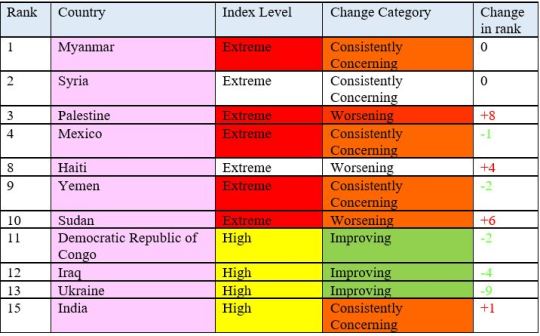
Source: ACLED index
Taiwan recently elected the most pro-independence leader (William Lai) as their president since it became a democracy and Chinese President Xi Jinping responded with a threat in his recent New Year speech, claiming that China will surely protect its territorial integrity. The threat in the Asia-Pacific region comes at an opportunity moment as the US and its allies are occupied with Ukraine and distracted by internal politics. Japan is preparing for the worst and plans to rearm itself to a level unseen since World War 2.
Moving on to the Mediterranean Island partially occupied by Turkey since 1974, Cyprus where recent incidents have pushed Turkey (Cypriots) to attack UN peacekeepers inside the buffer zone.
UN peacekeeper hurt in Cyprus buffer zone clash with Turkish Forces.
-Reuter (2023)
Splitting the Island in two. This attack has been condemned as a serious escalation pushing Cyprus's president to announce an increase in military spending by 2% of its GDP. Lastly, many are concerned about the potential spill over of the Israel-Gaza conflict, especially as Israel targets, Iran-backed Hezbollah fighters inside Lebanon territory all while Western allies target Iran-backed Houthis in Yemen. Everybody is watching closely for Iran's response which has been surprisingly tempered as far except for a surprise ballistic attack in Erbil, Iraq. Erbil the capital of Iraq’s autonomous Kurdish region is home to both a US consulate and an alleged Israeli spy base but the chance that major Middle-Eastern players like Iran will enter the conflict is heightened by the recent crisis at the eastern border. 2023 ended with Iranian Border forces skirmishing with Afghani Taliban over the border dispute. After New Year's Iran and Pakistan started attacking each other's border provinces with ballistic missiles in a sudden act of hostility the conflict seems to have been resolved for now as the aim on both sides was to attack groups acting in both countries towards independence of the cross-region of Baluchistan. Still, border tension remains high as neither Pakistan nor Iran wants to appear weak or accommodating in such a tense period for geo-political relations.
Russian President Vladimir Putin called for restraint from both Israel and Iran following a major escalation in tensions. Iran launched a large drone and missile attack on Israel over the weekend, in retaliation for an Israeli strike on the Iranian consulate in Damascus.
The Kremlin warned of "catastrophic consequences" for the Middle East if tensions escalate further.
Iran claims its attack was a limited response to the Israeli strike, which killed several Iranian military officials.
Both Russia and Iran agree on the need for a Palestinian state based on pre-1967 borders. However, the situation is complicated by Russia's recent purchase of Iranian weapons, which are being used in the war in Ukraine.
Renewed clashes along the northeastern border of Ukraine have triggered a fresh wave of displacement, with over 1,700 civilians forced to flee their homes. Russia's Ministry of Defence reported capturing five villages in a recent ground offensive. Ukrainian officials haven't confirmed these claims, but acknowledge ongoing fighting in some of the contested areas. The city of Vovchansk has borne the brunt of the attacks, with relentless airstrikes and rocket barrages causing widespread destruction. Journalists witnessed numerous air attacks and documented damaged buildings, some ablaze. The Associated Press described a harrowing scene of deserted streets, smouldering buildings, and the constant threat of air raids.
A bitter dispute between Mexico and Ecuador has erupted after Ecuadorian police raided the Mexican embassy in Quito to arrest a former vice president. Mexico has severed diplomatic relations and is considering legal action against Ecuador. The incident has divided Latin America, with some countries condemning Ecuador's actions and others expressing support. Colombia and Nicaragua have followed Mexico in severing ties with Ecuador.
#war of the worlds#gaza strip#el salvador#iran#iraq war#colonial violence#colonization#ukraine#russo ukrainian war#myanmar civil war#mexico#cyprus#ecuador#somalia#burkina faso#tigray#congo genocide#ethopia#rwanda
2 notes
·
View notes
Text

0 notes
Text

The Māori tino rangatiratanga [sovereignty, self-determination] flag flying alongside Palestinian flags. The tino rangatiratanga flag is black at the top and red at the bottom, the two colours separated by white lines forming a koru (spiral). The Palestinian flag has three horizontal stripes (black, white and green) with a red triangle on the left.
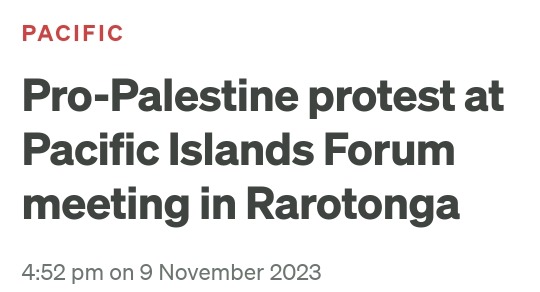
"Pro-Palestine protest at Pacific Islands Forum meeting in Rarotonga"

A young child holding an ili (Samoan woven fan) that says Samoa for Palestine
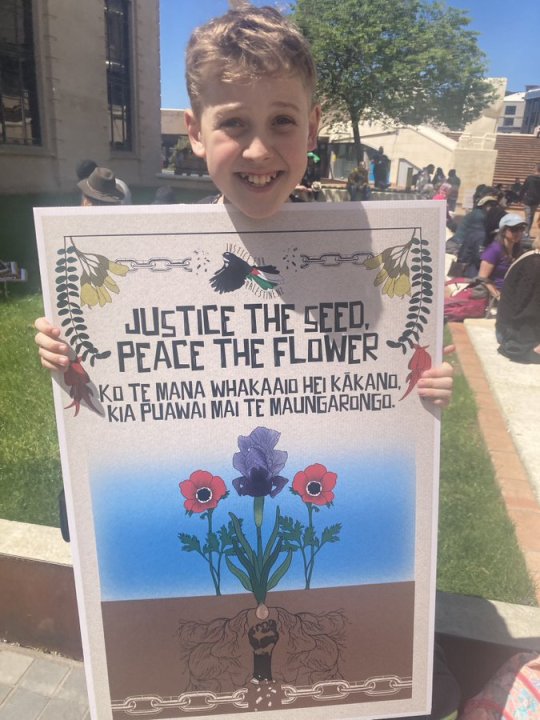
A young boy holds a sign reading Justice the seed, peace the flower / Ko te mana whakaaiko hei kākano, kia puawai mai te maungarongo. Beneath is artwork of a fist breaking free from chains below blooming flowers.


Left: the 1975 Māori Land March. Right: the 2018-2019 Palestinian Great March of Return.

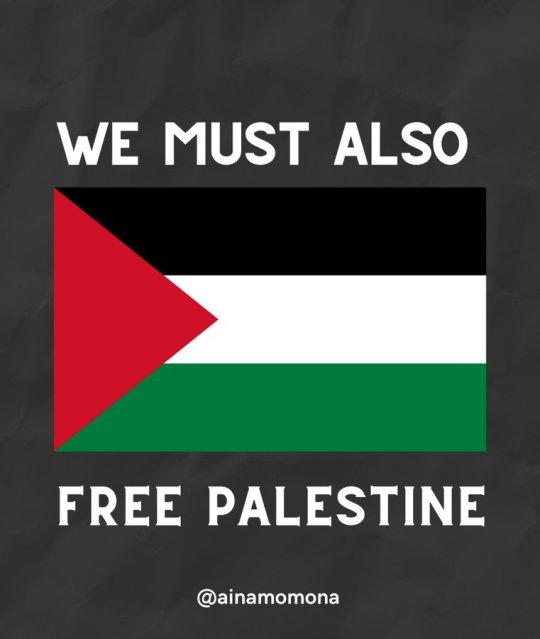
If we want to free Hawai'i... [Hawaiian flag] we must also free Palestine [Palestinian flag]. Credit to @ainamomona

A young Māori boy holding a sign that reads MANA MOTUHAKE [independence/autonomy] 4 PALESTINE
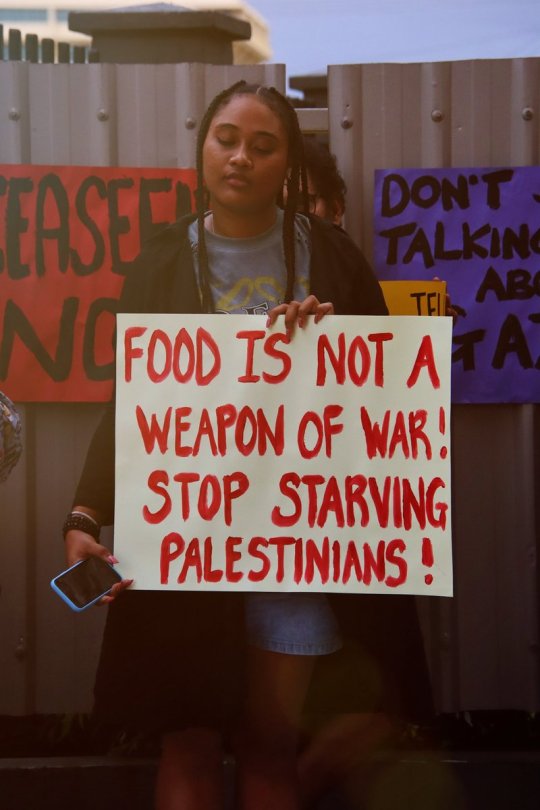
A Fijian woman holding a sign that reads Food is not a weapon of war! Stop starving Palestinians! Behind are two more signs. One says CEASEFIRE NOW and the other says DON'T STOP TALKING ABOUT GAZA
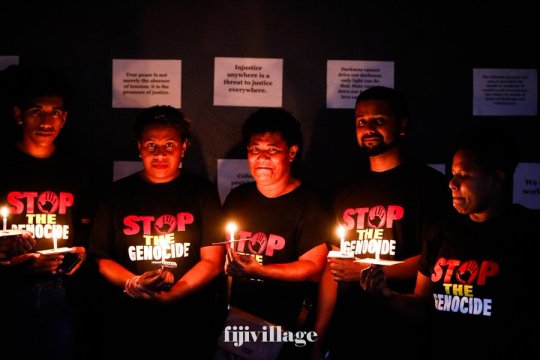
A group of Fijians holding candles and wearing shirts that read STOP THE GENOCIDE
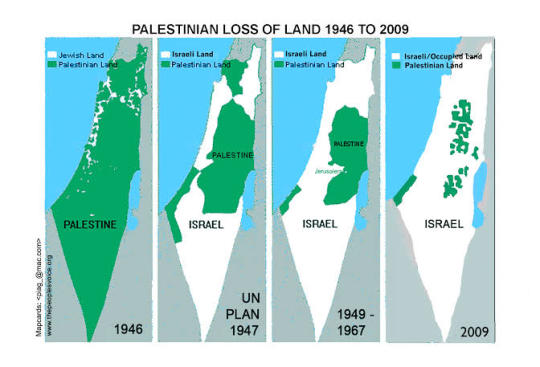

Left: a diagram of Palestinian land loss between 1946 and 2009. Right: a diagram of Māori land loss in the North Island of Aotearoa between 1860 and 2000.

A sign reading TANGATA WHENUA [indigenous people] FOR PALESTINE [tino rangatiratanga symbol, Palestine flag symbol]

Three Pasifika people holding signs. The first says MAI LE VAITAFE AGA'I I LE SAMI! [Samoan: from the river to the sea] FREE PALESTINE! The second sign says FROM OUR PASIFIKA OCEAN TO THE RIVER TO THE SEA FREE PALESTINE. The final sign shows the Palestinian and Tongan flags and says 'OFA KI PALESITAINE [Tongan: Love to Palestine]

A group of Pasifika holding signs and banners. They say "HOW MANY MORE KILLINGS IS ENOUGH FOR YOU?" "KŪ'E! KŪ'E! [Hawaiian: Resist! Resist!] PASIFIKA STANDS WITH PALESTINE" "'OFA KI PALESTINE" "FROM THE PACIFIC TO THE RIVER TO THE SEA, PALESTINE WILL BE FREE" "WHERE IS YOUR HUMANITY?" "SAMOANS FOR PALESTINE" "FROM THE RIVER TO THE SEA" "KŪ'E KŪ'E KANAKA WITH PALESTINE" "FREE PALESTINE CEASEFIRE NOW"

A West Papuan man holding two signs. The first says WEST PAPUA STAND WITH MYANMAR. The second says WEST PAPUA STAND WITH PALESTINE
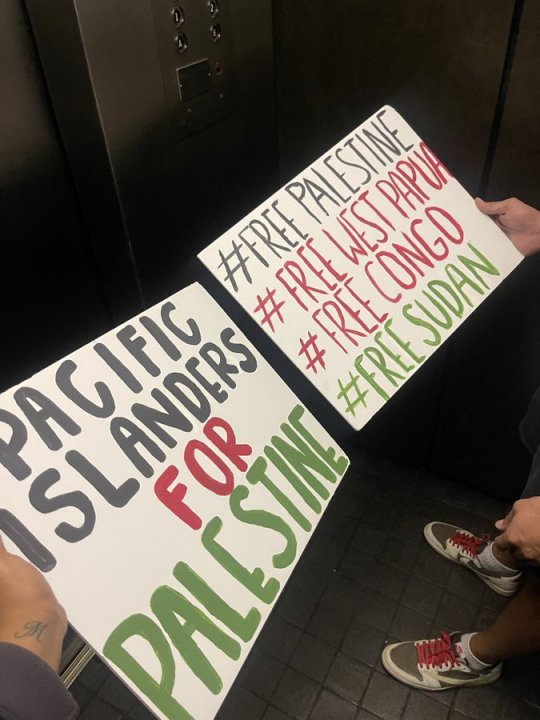
Two signs. The first says PACIFIC ISLANDERS FOR PALESTINE. The second says #FREE PALESTINE #FREE WEST PAPUA #FREE CONGO #FREE SUDAN

A Palestinian flag decorated with Samoan patterns. Words say 'AGA'I MAI LE VAITAFE E O'O ATU I LE SAMI FROM THE RIVER TO THE SEA #Sāmoans4Palestine

A tweet from Tamatha Paul (Waikato-Tainui, Ngāti Awa) on 29 June 2023. Another big win this week, courtesy of @Just4Pal and @nikau4poneke, we [Pōneke Wellington] will be Sister Cities with the Palestinian city of Ramallah 😍 Free Palestine!!!
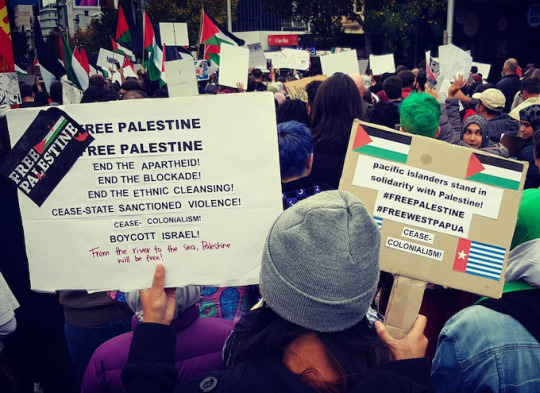
A Pasifika woman holding two signs. The first says FREE PALESTINE FREE PALESTINE END THE APARTHEID! END THE BLOCKADE! END THE ETHNIC CLEANSING! CEASE STATE SANCTIONED VIOLENCE! CEASE COLONIALISM! BOYCOTT ISRAEL! From the river to the sea, Palestine will be free! The second sign has pictures of Palestinian and West Papuan flags. It says pacific islanders stand in solidarity with Palestine! #FREEWESTPAPUA #FREEPALESTINE CEASE COLONIALISM

A sign that has the tino rangatiratanga flag at the top and Palestinian flag at the bottom. It says Mai te awa ki te moana [from the river to the sea] MĀORI LAW STUDENTS For a FREE PALESTINE
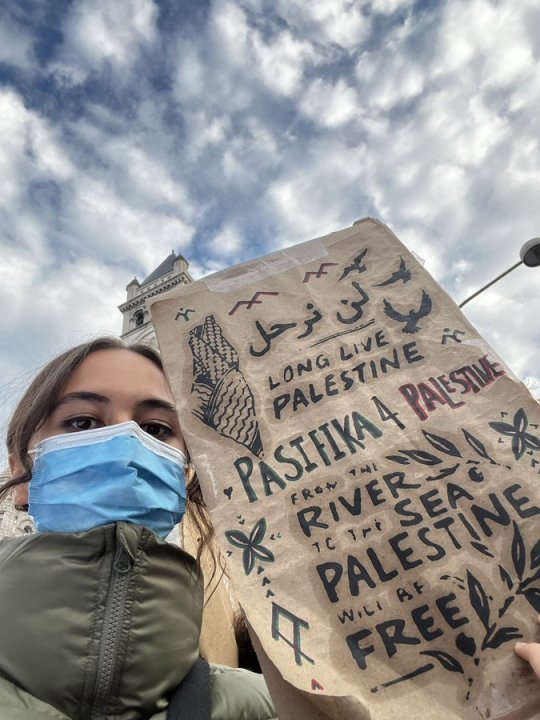
A Pasifika woman holding a sign decorated with Pacific symbols. It says LONG LIVE PALESTINE - PASIFIKA 4 PALESTINE - FROM THE RIVER TO THE SEA PALESTINE WILL BE FREE

Another Samoan fan. This one says PALESTINE WILL BE FREE
6K notes
·
View notes
Text
Screaming people and bodies everywhere: The horrific aftermath of Myanmar junta airstrike that killed 133 | CNN
CNN — Relatives were still recovering the charred bodies and limbs of victims killed in a military airstrike on a village in central Myanmar Wednesday, a day after one of the deadliest attacks since the junta seized power in a coup two years ago. An eyewitness, who hid in a tunnel during the attack, described a scene of horror as he approached the site of the military airstrike – of children…
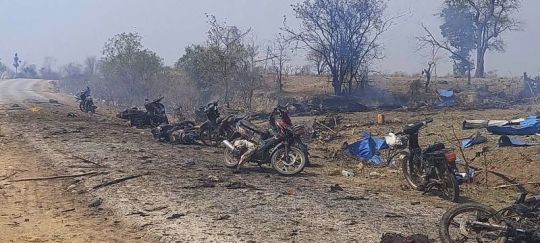
View On WordPress
#asia#bombings#brand safety-nsf death#brand safety-nsf sensitive#brand safety-nsf severe#brand safety-nsf violence#brand safety-nsf war and military#civilian casualties#conflicts and war#continents and regions#death and dying#deaths and fatalities#domestic alerts#domestic-international news#iab-bereavement#iab-family and relationships#iab-war and conflicts#military#military operations#myanmar#society#southeast asia#unrest#war casualties
0 notes
Text
Forcing your computer to rat you out

Powerful people imprisoned by the cluelessness of their own isolation, locked up with their own motivated reasoning: “It’s impossible to get a CEO to understand something when his quarterly earnings call depends on him not understanding it.”
Take Mark Zuckerberg. Zuckerberg insists that anyone who wanted to use a pseudonym online is “two-faced,” engaged in dishonest social behavior. The Zuckerberg Doctrine claims that forcing people to use their own names is a way to ensure civility. This is an idea so radioactively wrong, it can be spotted from orbit.
From the very beginning, social scientists (both inside and outside Facebook) told Zuckerberg that he was wrong. People have lots of reasons to hide their identities online, both good and bad, but a Real Names Policy affects different people differently:
https://memex.craphound.com/2018/01/22/social-scientists-have-warned-zuck-all-along-that-the-facebook-theory-of-interaction-would-make-people-angry-and-miserable/
For marginalized and at-risk people, there are plenty of reasons to want to have more than one online identity — say, because you are a #MeToo whistleblower hoping that Harvey Weinstein won’t sic his ex-Mossad mercenaries on you:
https://www.newyorker.com/news/news-desk/harvey-weinsteins-army-of-spies
Or maybe you’re a Rohingya Muslim hoping to avoid the genocidal attentions of the troll army that used Facebook to organize — under their real, legal names — to rape and murder you and everyone you love:
https://www.amnesty.org/en/latest/news/2022/09/myanmar-facebooks-systems-promoted-violence-against-rohingya-meta-owes-reparations-new-report/
But even if no one is looking to destroy your life or kill you and your family, there are plenty of good reasons to present different facets of your identity to different people. No one talks to their lover, their boss and their toddler in exactly the same way, or reveals the same facts about their lives to those people. Maintaining different facets to your identity is normal and healthy — and the opposite, presenting the same face to everyone in your life, is a wildly terrible way to live.
None of this is controversial among social scientists, nor is it hard to grasp. But Zuckerberg stubbornly stuck to this anonymity-breeds-incivility doctrine, even as dictators used the fact that Facebook forced dissidents to use their real names to retain power through the threat (and reality) of arrest and torture:
https://pluralistic.net/2023/01/25/nationalize-moderna/#hun-sen
Why did Zuck cling to this dangerous and obvious fallacy? Because the more he could collapse your identity into one unitary whole, the better he could target you with ads. Truly, it is impossible to get a billionaire to understand something when his mega-yacht depends on his not understanding it.
This motivated reasoning ripples through all of Silicon Valley’s top brass, producing what Anil Dash calls “VC QAnon,” the collection of conspiratorial, debunked and absurd beliefs embraced by powerful people who hold the digital lives of billions of us in their quivering grasp:
https://www.anildash.com/2023/07/07/vc-qanon/
These fallacy-ridden autocrats like to disguise their demands as observations, as though wanting something to be true was the same as making it true. Think of when Eric Schmidt — then the CEO of Google — dismissed online privacy concerns, stating “If you have something that you don’t want anyone to know, maybe you shouldn’t be doing it in the first place”:
https://www.eff.org/deeplinks/2009/12/google-ceo-eric-schmidt-dismisses-privacy
Schmidt was echoing the sentiments of his old co-conspirator, Sun Microsystems CEO Scott McNealy: “You have zero privacy anyway. Get over it”:
https://www.wired.com/1999/01/sun-on-privacy-get-over-it/
Both men knew better. Schmidt, in particular, is very jealous of his own privacy. When Cnet reporters used Google to uncover and publish public (but intimate and personal) facts about Schmidt, Schmidt ordered Google PR to ignore all future requests for comment from Cnet reporters:
https://www.cnet.com/tech/tech-industry/how-cnet-got-banned-by-google/
(Like everything else he does, Elon Musk’s policy of responding to media questions about Twitter with a poop emoji is just him copying things other people thought up, making them worse, and taking credit for them:)
https://www.theverge.com/23815634/tesla-elon-musk-origin-founder-twitter-land-of-the-giants
Schmidt’s actions do not reflect an attitude of “If you have something that you don’t want anyone to know, maybe you shouldn’t be doing it in the first place.” Rather, they are the normal response that we all have to getting doxed.
When Schmidt and McNealy and Zuck tell us that we don’t have privacy, or we don’t want privacy, or that privacy is bad for us, they’re disguising a demand as an observation. “Privacy is dead” actually means, “When privacy is dead, I will be richer than you can imagine, so stop trying to save it, goddamnit.”
We are all prone to believing our own bullshit, but when a tech baron gets high on his own supply, his mental contortions have broad implications for all of us. A couple years after Schmidt’s anti-privacy manifesto, Google launched Google Plus, a social network where everyone was required to use their “real name.”
This decision — justified as a means of ensuring civility and a transparent ruse to improve ad targeting — kicked off the Nym Wars:
https://epeus.blogspot.com/2011/08/google-plus-must-stop-this-identity.html
One of the best documents to come out of that ugly conflict is “Falsehoods Programmers Believe About Names,” a profound and surprising enumeration of all the ways that the experiences of tech bros in Silicon Valley are the real edge-cases, unreflective of the reality of billions of their users:
https://www.kalzumeus.com/2010/06/17/falsehoods-programmers-believe-about-names/
This, in turn, spawned a whole genre of programmer-fallacy catalogs, falsehoods programmers believe about time, currency, birthdays, timezones, email addresses, national borders, nations, biometrics, gender, language, alphabets, phone numbers, addresses, systems of measurement, and, of course, families:
https://github.com/kdeldycke/awesome-falsehood
But humility is in short supply in tech. It’s impossible to get a programmer to understand something when their boss requires them not to understand it. A programmer will happily insist that ordering you to remove your “mask” is for your own good — and not even notice that they’re taking your skin off with it.
There are so many ways that tech executives could improve their profits if only we would abandon our stubborn attachment to being so goddamned complicated. Think of Netflix and its anti-passsword-sharing holy war, which is really a demand that we redefine “family” to be legible and profitable for Netflix:
https://pluralistic.net/2023/02/02/nonbinary-families/#red-envelopes
But despite the entreaties of tech companies to collapse our identities, our families, and our online lives into streamlined, computably hard-edged shapes that fit neatly into their database structures, we continue to live fuzzy, complicated lives that only glancingly resemble those of the executives seeking to shape them.
Now, the rich, powerful people making these demands don’t plan on being constrained by them. They are conservatives, in the tradition of #FrankWilhoit, believers in a system of “in-groups whom the law protects but does not bind, alongside out-groups whom the law binds but does not protect”:
https://crookedtimber.org/2018/03/21/liberals-against-progressives/#comment-729288
As with Schmidt’s desire to spy on you from asshole to appetite for his own personal gain, and his violent aversion to having his own personal life made public, the tech millionaires and billionaires who made their fortune from the flexibility of general purpose computers would like to end that flexibility. They insist that the time for general purpose computers has passed, and that today, “consumers” crave the simplicity of appliances:
https://memex.craphound.com/2012/01/10/lockdown-the-coming-war-on-general-purpose-computing/
It is in the War On General Purpose Computing that we find the cheapest and flimsiest rhetoric. Companies like Apple — and their apologists — insist that no one wants to use third-party app stores, or seek out independent repair depots — and then spend millions to make sure that it’s illegal to jailbreak your phone or get it fixed outside of their own official channel:
https://doctorow.medium.com/apples-cement-overshoes-329856288d13
The cognitive dissonance of “no one wants this,” and “we must make it illegal to get this” is powerful, but the motivated reasoning is more powerful still. It is impossible to get Tim Cook to understand something when his $49 million paycheck depends on him not understanding it.
The War on General Purpose Computing has been underway for decades. Computers, like the people who use them, stubbornly insist on being reality-based, and the reality of computers is that they are general purpose. Every computer is a Turing complete, universal Von Neumann machine, which means that it can run every valid program. There is no way to get a computer to be almost Turing Complete, only capable of running programs that don’t upset your shareholders’ fragile emotional state.
There is no such thing as a printer that will only run the “reject third-party ink” program. There is no such thing as a phone that will only run the “reject third-party apps” program. There are only laws, like the Section 1201 of the Digital Millennium Copyright Act, that make writing and distributing those programs a felony punishable by a five-year prison sentence and a $500,000 fine (for a first offense).
That is to say, the War On General Purpose Computing is only incidentally a technical fight: it is primarily a legal fight. When Apple says, “You can’t install a third party app store on your phone,” what they means is, “it’s illegal to install that third party app store.” It’s not a technical countermeasure that stands between you and technological self-determination, it’s a legal doctrine we can call “felony contempt of business model”:
https://locusmag.com/2020/09/cory-doctorow-ip/
But the mighty US government will not step in to protect a company’s business model unless it at least gestures towards the technical. To invoke DMCA 1201, a company must first add the thinnest skin of digital rights management to their product. Since 1201 makes removing DRM illegal, a company can use this molecule-thick scrim of DRM to felonize any activity that the DRM prevents.
More than 20 years ago, technologists started to tinker with ways to combine the legal and technical to tame the wild general purpose computer. Starting with Microsoft’s Palladium project, they theorized a new “Secure Computing” model for allowing companies to reach into your computer long after you had paid for it and brought it home, in order to discipline you for using it in ways that undermined its shareholders’ interest.
Secure Computing began with the idea of shipping every computer with two CPUs. The first one was the normal CPU, the one you interacted with when you booted it up, loaded your OS, and ran programs. The second CPU would be a Trusted Platform Module, a brute-simple system-on-a-chip designed to be off-limits to modification, even by its owner (that is, you).
The TPM would ship with a limited suite of simple programs it could run, each thoroughly audited for bugs, as well as secret cryptographic signing keys that you were not permitted to extract. The original plan called for some truly exotic physical security measures for that TPM, like an acid-filled cavity that would melt the chip if you tried to decap it or run it through an electron-tunneling microscope:
https://pluralistic.net/2020/12/05/trusting-trust/#thompsons-devil
This second computer represented a crack in the otherwise perfectly smooth wall of a computer’s general purposeness; and Trusted Computing proposed to hammer a piton into that crack and use it to anchor a whole superstructure that could observe — and limited — the activity of your computer.
This would start with observation: the TPM would observe every step of your computer’s boot sequence, creating cryptographic hashes of each block of code as it loaded and executed. Each stage of the boot-up could be compared to “known good” versions of those programs. If your computer did something unexpected, the TPM could halt it in its tracks, blocking the boot cycle.
What kind of unexpected things do computers do during their boot cycle? Well, if your computer is infected with malware, it might load poisoned versions of its operating system. Once your OS is poisoned, it’s very hard to detect its malicious conduct, since normal antivirus programs rely on the OS to faithfully report what your computer is doing. When the AV program asks the OS to tell it which programs are running, or which files are on the drive, it has no choice but to trust the OS’s response. When the OS is compromised, it can feed a stream of lies to users’ programs, assuring these apps that everything is fine.
That’s a very beneficial use for a TPM, but there’s a sinister flipside: the TPM can also watch your boot sequence to make sure that there aren’t beneficial modifications present in your operating system. If you modify your OS to let you do things the manufacturer wants to prevent — like loading apps from a third-party app-store — the TPM can spot this and block it.
Now, these beneficial and sinister uses can be teased apart. When the Palladium team first presented its research, my colleague Seth Schoen proposed an “owner override”: a modification of Trusted Computing that would let the computer’s owner override the TPM:
https://web.archive.org/web/20021004125515/http://vitanuova.loyalty.org/2002-07-05.html
This override would introduce its own risks, of course. A user who was tricked into overriding the TPM might expose themselves to malicious software, which could harm that user, as well as attacking other computers on the user’s network and the other users whose data were on the compromised computer’s drive.
But an override would also provide serious benefits: it would rule out the monopolistic abuse of a TPM to force users to run malicious code that the manufacturer insisted on — code that prevented the user from doing things that benefited the user, even if it harmed the manufacturer’s shareholders. For example, with owner override, Microsoft couldn’t force you to use its official MS Office programs rather than third-party compatible programs like Apple’s iWork or Google Docs or LibreOffice.
Owner override also completely changed the calculus for another, even more dangerous part of Trusted Computing: remote attestation.
Remote Attestation is a way for third parties to request a reliable, cryptographically secured assurances about which operating system and programs your computer is running. In Remote Attestation, the TPM in your computer observes every stage of your computer’s boot, gathers information about all the programs you’re running, and cryptographically signs them, using the signing keys the manufacturer installed during fabrication.
You can send this “attestation” to other people on the internet. If they trust that your computer’s TPM is truly secure, then they know that you have sent them a true picture of your computer’s working (the actual protocol is a little more complicated and involves the remote party sending you a random number to cryptographically hash with the attestation, to prevent out-of-date attestations).
Now, this is also potentially beneficial. If you want to make sure that your technologically unsophisticated friend is running an uncompromised computer before you transmit sensitive data to it, you can ask them for an attestation that will tell you whether they’ve been infected with malware.
But it’s also potentially very sinister. Your government can require all the computers in its borders to send a daily attestation to confirm that you’re still running the mandatory spyware. Your abusive spouse — or abusive boss — can do the same for their own disciplinary technologies. Such a tool could prevent you from connecting to a service using a VPN, and make it impossible to use Tor Browser to protect your privacy when interacting with someone who wishes you harm.
The thing is, it’s completely normal and good for computers to lie to other computers on behalf of their owners. Like, if your IoT ebike’s manufacturer goes out of business and all their bikes get bricked because they can no longer talk to their servers, you can run an app that tricks the bike into thinking that it’s still talking to the mothership:
https://nltimes.nl/2023/07/15/alternative-app-can-unlock-vanmoof-bikes-popular-amid-bankruptcy-fears
Or if you’re connecting to a webserver that tries to track you by fingerprinting you based on your computer’s RAM, screen size, fonts, etc, you can order your browser to send random data about this stuff:
https://jshelter.org/fingerprinting/
Or if you’re connecting to a site that wants to track you and nonconsensually cram ads into your eyeballs, you can run an adblocker that doesn’t show you the ads, but tells the site that it did:
https://www.eff.org/deeplinks/2019/07/adblocking-how-about-nah
Owner override leaves some of the beneficial uses of remote attestation intact. If you’re asking a friend to remotely confirm that your computer is secure, you’re not going to use an override to send them bad data about about your computer’s configuration.
And owner override also sweeps all of the malicious uses of remote attestation off the board. With owner override, you can tell any lie about your computer to a webserver, a site, your boss, your abusive spouse, or your government, and they can’t spot the lie.
But owner override also eliminates some beneficial uses of remote attestation. For example, owner override rules out remote attestation as a way for strangers to play multiplayer video games while confirming that none of them are using cheat programs (like aimhack). It also means that you can’t use remote attestation to verify the configuration of a cloud server you’re renting in order to assure yourself that it’s not stealing your data or serving malware to your users.
This is a tradeoff, and it’s a tradeoff that’s similar to lots of other tradeoffs we make online, between the freedom to do something good and the freedom to do something bad. Participating anonymously, contributing to free software, distributing penetration testing tools, or providing a speech platform that’s open to the public all represent the same tradeoff.
We have lots of experience with making the tradeoff in favor of restrictions rather than freedom: powerful bad actors are happy to attach their names to their cruel speech and incitement to violence. Their victims are silenced for fear of that retaliation.
When we tell security researchers they can’t disclose defects in software without the manufacturer’s permission, the manufacturers use this as a club to silence their critics, not as a way to ensure orderly updates.
When we let corporations decide who is allowed to speak, they act with a mixture of carelessness and self-interest, becoming off-the-books deputies of authoritarian regimes and corrupt, powerful elites.
Alas, we made the wrong tradeoff with Trusted Computing. For the past twenty years, Trusted Computing has been creeping into our devices, albeit in somewhat denatured form. The original vision of acid-filled secondary processors has been replaced with less exotic (and expensive) alternatives, like “secure enclaves.” With a secure enclave, the manufacturer saves on the expense of installing a whole second computer, and instead, they draw a notional rectangle around a region of your computer’s main chip and try really hard to make sure that it can only perform a very constrained set of tasks.
This gives us the worst of all worlds. When secure enclaves are compromised, we not only lose the benefit of cryptographic certainty, knowing for sure that our computers are only booting up trusted, unalterted versions of the OS, but those compromised enclaves run malicious software that is essentially impossible to detect or remove:
https://pluralistic.net/2022/07/28/descartes-was-an-optimist/#uh-oh
But while Trusted Computing has wormed its way into boot-restrictions — preventing you from jailbreaking your computer so it will run the OS and apps of your choosing — there’s been very little work on remote attestation…until now.
Web Environment Integrity is Google’s proposal to integrate remote attestation into everyday web-browsing. The idea is to allow web-servers to verify what OS, extensions, browser, and add-ons your computer is using before the server will communicate with you:
https://github.com/RupertBenWiser/Web-Environment-Integrity/blob/main/explainer.md
Even by the thin standards of the remote attestation imaginaries, there are precious few beneficial uses for this. The googlers behind the proposal have a couple of laughable suggestions, like, maybe if ad-supported sites can comprehensively refuse to serve ad-blocking browsers, they will invest the extra profits in making things you like. Or: letting websites block scriptable browsers will make it harder for bad people to auto-post fake reviews and comments, giving users more assurances about the products they buy.
But foundationally, WEI is about compelling you to disclose true facts about yourself to people who you want to keep those facts from. It is a Real Names Policy for your browser. Google wants to add a new capability to the internet: the ability of people who have the power to force you to tell them things to know for sure that you’re not lying.
The fact that the authors assume this will be beneficial is just another “falsehood programmers believe”: there is no good reason to hide the truth from other people. Squint a little and we’re back to McNealy’s “Privacy is dead, get over it.” Or Schmidt’s “If you have something that you don’t want anyone to know, maybe you shouldn’t be doing it in the first place.”
And like those men, the programmers behind this harebrained scheme don’t imagine that it will ever apply to them. As Chris Palmer — who worked on Chromium — points out, this is not compatible with normal developer tools or debuggers, which are “incalculably valuable and not really negotiable”:
https://groups.google.com/a/chromium.org/g/blink-dev/c/Ux5h_kGO22g/m/5Lt5cnkLCwAJ
This proposal is still obscure in the mainstream, but in tech circles, it has precipitated a flood of righteous fury:
https://arstechnica.com/gadgets/2023/07/googles-web-integrity-api-sounds-like-drm-for-the-web/
As I wrote last week, giving manufacturers the power to decide how your computer is configured, overriding your own choices, is a bad tradeoff — the worst tradeoff, a greased slide into terminal enshittification:
https://pluralistic.net/2023/07/24/rent-to-pwn/#kitt-is-a-demon
This is how you get Unauthorized Bread:
https://arstechnica.com/gaming/2020/01/unauthorized-bread-a-near-future-tale-of-refugees-and-sinister-iot-appliances/
All of which leads to the question: what now? What should be done about WEI and remote attestation?
Let me start by saying: I don’t think it should be illegal for programmers to design and release these tools. Code is speech, and we can’t understand how this stuff works if we can’t study it.
But programmers shouldn’t deploy it in production code, in the same way that programmers should be allowed to make pen-testing tools, but shouldn’t use them to attack production systems and harm their users. Programmers who do this should be criticized and excluded from the society of their ethical, user-respecting peers.
Corporations that use remote attestation should face legal restrictions: privacy law should prevent the use of remote attestation to compel the production of true facts about users or the exclusion of users who refuse to produce those facts. Unfair competition law should prevent companies from using remote attestation to block interoperability or tie their products to related products and services.
Finally, we must withdraw the laws that prevent users and programmers from overriding TPMs, secure enclaves and remote attestations. You should have the right to study and modify your computer to produce false attestations, or run any code of your choosing. Felony contempt of business model is an outrage. We should alter or strike down DMCA 1201, the Computer Fraud and Abuse Act, and other laws (like contract law’s “tortious interference”) that stand between you and “sole and despotic dominion” over your own computer. All of that applies not just to users who want to reconfigure their own computers, but also toolsmiths who want to help them do so, by offering information, code, products or services to jailbreak and alter your devices.
Tech giants will squeal at this, insisting that they serve your interests when they prevent rivals from opening up their products. After all, those rivals might be bad guys who want to hurt you. That’s 100% true. What is likewise true is that no tech giant will defend you from its own bad impulses, and if you can’t alter your device, you are powerless to stop them:
https://pluralistic.net/2022/11/14/luxury-surveillance/#liar-liar
Companies should be stopped from harming you, but the right place to decide whether a business is doing something nefarious isn’t in the boardroom of that company’s chief competitor: it’s in the halls of democratically accountable governments:
https://www.eff.org/wp/interoperability-and-privacy
So how do we get there? Well, that’s another matter. In my next book, The Internet Con: How to Seize the Means of Computation (Verso Books, Sept 5), I lay out a detailed program, describing which policies will disenshittify the internet, and how to get those policies:
https://www.versobooks.com/products/3035-the-internet-con
Predictably, there are challenges getting this kind of book out into the world via our concentrated tech sector. Amazon refuses to carry the audio edition on its monopoly audiobook platform, Audible, unless it is locked to Amazon forever with mandatory DRM. That’s left me self-financing my own DRM-free audio edition, which is currently available for pre-order via this Kickstarter:
http://seizethemeansofcomputation.org
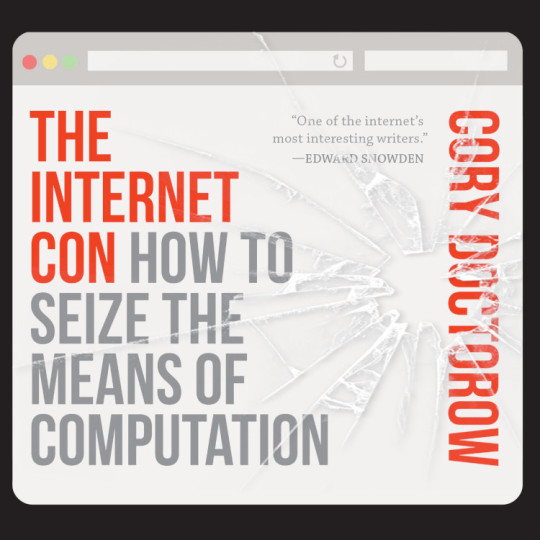
I’m kickstarting the audiobook for “The Internet Con: How To Seize the Means of Computation,” a Big Tech disassembly manual to disenshittify the web and bring back the old, good internet. It’s a DRM-free book, which means Audible won’t carry it, so this crowdfunder is essential. Back now to get the audio, Verso hardcover and ebook:
https://www.kickstarter.com/projects/doctorow/the-internet-con-how-to-seize-the-means-of-computation

If you’d like an essay-formatted version of this post to read or share, here’s a link to it on pluralistic.net, my surveillance-free, ad-free, tracker-free blog:
https://pluralistic.net/2023/08/02/self-incrimination/#wei-bai-bai

[Image ID: An anatomical drawing of a flayed human head; it has been altered to give it a wide-stretched mouth revealing a gadget nestled in the back of the figure's throat, connected by a probe whose two coiled wires stretch to an old fashioned electronic box. The head's eyes have been replaced by the red, menacing eye of HAL 9000 from Stanley Kubrick's '2001: A Space Odyssey.' Behind the head is a code waterfall effect as seen in the credits of the Wachowskis' 'The Matrix.']

Image: Cryteria (modified) https://commons.wikimedia.org/wiki/File:HAL9000.svg
CC BY 3.0 https://creativecommons.org/licenses/by/3.0/deed.en
#pluralistic#chaffing#spoofing#remote attestation#rene descartes#adversarial interoperability#war on general purpose computing#canvas attacks#vpns#compelled speech#onion routing#owner override#stalkerware#ngscb#palladium#trusted computing#secure enclaves#tor#interop#net neutrality#taking the fifth#right to remain silent#real names policy#the zuckerberg doctrine#none of your business#the right to lie#right to repair#bossware#spyware#wei web environment integrity
2K notes
·
View notes
Text
its a common misconception that the mid 90s to early 2000s was 'the wild west of the internet'. actually 2017-2018, the period during which facebook played a "determining role" in ethnic violence in myanmar, was 'the wild west of the internet', because that's when it was inextricably tied to a horrific genocide
583 notes
·
View notes
Text
Ethnic cleansing? Genocide? Apartheid?
Throwing around these buzzwords to describe the Israel-Hamas war because you’ve seen them on social media doesn’t make you right, and it doesn’t make you an activist.
It makes you ignorant, intellectually dishonest, and lazy for parroting biased talking points with no concept about what these terms actually mean.
What is apartheid?
Well, it was first used to describe the political system in South Africa and today’s Namibia whereby racism was institutionalised. This manner of governance meant that clear racial segregation would occur, in a manner that benefited the white race and would actively oppress those who had darker skin.
This meant that there were white-only spaces, white people would get prioritised when it came to education and jobs, and relationships/marriages between white peoples and coloured people were illegal.
Is Israel objectively an apartheid state? There are no laws that actively favour one group over the other. There is a sizeable population of Israeli Arabs that can thrive in the same way as the Israeli Jews can. There are laws against discrimination on the basis of gender, race/ethnicity, and sexual orientation.
Palestinians from Gaza are allowed to work in Israel through a work permit system. There are about 150,000 Palestinians working in Israel, most of which live in Israel and some come from Gaza/the West Bank. They aren’t denied rights institutionally.
Is it harder to get a job or education in Israel if you’re a Palestinian from Gaza? Sure, because of different governments. It’s like how it’s a lot easier for you to find a job in your own country (in terms of paperwork and bureaucracy) than overseas. But you’re not denied the right to apply.
Of course, if you have a history of violence, a criminal record, or your family has ties to terrorists, then it’ll be a lot harder to get an approved work permit. But that’s not apartheid. That’s common sense, and a regulation practiced by all countries that minimally desire to protect their own population from danger.
Ethnic cleansing and genocide
These two concepts can go hand-in-hand. Ethnic cleansing refers to the mass expulsion or killing of a group of people based on their ethnicity. Similarly, genocide is the purposeful killing of a group of people solely with the intention of annihilating them.
Famous examples? The Holocaust, of course, where the Nazi regime believed in the superiority of the Aryan race and decided to declare genocide on the Jews, Romanis, the LGBTQ+ community, people with disabilities, people with “Asian features”, and many many other groups. Anyone who they didn’t think was “pure”.
Their aim was to ensure that the Aryan race propagated without having “impure” blood affecting the bloodlines. They even started a eugenics programme called Lebensborn to ensure that more pure Aryan babies were born.
More recent examples? The Rwandan genocide where the Hutus attempted to wipe out the Tutsis on the basis of ethnicity. They mandated that Tutsis mention their ethnicity on state-issued ID cards in order for the Hutus in power to be able to identify them and then kill them.
Or the Yazidi genocide which happened so recently, in which ISIL killed, raped, and sent thousands of Yazidis into conversion camps on the basis of their ethnicity. They also took Yazidi women as sex slaves and raped and tortured them.
Or the Rohingya Muslims in the Rakhine State in Myanmar, and how there was a mass killing and expulsion of them from the country, forcing them to flee to Bangladesh to take refuge, crating the world’s largest refugee camp.
Or how ISIS killed thousands of people from Christian groups in Iraq, Syria, Egypt, and Libya because of their faith, leading the US, EU, and UK to label this as religious genocide and condemned their actions.
Has Israel been practicing ethnic cleansing and genocide on Palestinians all these years?
Well, the birth rate of the Palestinian population in Gaza, the West Bank, and in Israel has been steadily increasing all these years.
So, no. No ethnic cleansing, no genocide. They are free to have as many children as they desire.
The UN Genocide Convention
The United Nations has 5 actions that constitute genocide.
1. Killing members of a target group
Israel is targeting Hamas officials with the aim of wiping out the terrorist group and ensuring that such a deadly attack on Israeli soil doesn’t happen again. I suppose you could call it genocide against Hamas, but they’re killing Hamas because they’re terrorists, not because they’re Palestinian. Shouldn’t everyone believe in genocide against terrorists?
But look at Black Saturday. Look at Hamas’ rhetoric. They repeatedly call for the annihilation of Israel and genocide of Jews. When will the media start believing what they say, word for word, instead of trying to spin it into “hmm maybe they want to kill all the Jews because they’re freedom fighters!”
War has collateral damage. Of course the innocent civilians don’t deserve to suffer just because of the actions of their government, but there have been warnings given to the Palestinian civilians prior to Israel striking the areas. There are consequences of attacking a country first, and then having that country attack you back.
2. Causing people of the group serious bodily or mental harm
The UN refers to sexual violence as the prime example of non-fatal harm.
Sexual violence has occurred. Hamas have kidnapped and raped women and even paraded the bodies of half-naked women around. But I f Israel had done the same, it’ll be the first thing appearing on everyone’s BBC push notifications (without even being confirmed as true).
3. Imposing living conditions intended to destroy the group
Many people refer to the blockade that Israel imposed around the Gaza Strip as an example of this.
This blockade was imposed by both Israel and Egypt in 2005. Its aim was to prevent smuggling of weapons into Gaza, and isolate the reign of Hamas to the region. This was to ensure the safety of Israel and Egypt.
Did this blockade pose serious challenges to the Gazan civilians? Of course. But that’s a consequence of having a terrorist government. If you have a terrorist group running your country, don’t be surprised if neighbouring countries are extra careful about who or what they allow in or out of the borders.
Many authorities from other Arab nations have also expressed approval of Egypt’s border restrictions, and even encouraged Egypt to flood the terror tunnels that Hamas has dug under the city. As a side note, other Arab nations have not historically been very kind or welcoming to Palestinians. Syria has killed over 4000 Palestinians, and many Arab countries are now refusing any refuge for Palestinians. But no one cares about that because it doesn’t make Israel look bad. All they do now is use the images of dead Palestinians under the hands of Syria and reuse them to propagate fake news.
The blockade has been labelled as a human rights violation because of collective punishment. Many humanitarian organisations believe that the blockade has caused the Palestinian civilians disproportionate harm.
Contrary to popular belief, Israel isn’t disallowing humanitarian aid from coming through the borders. Fuel, food, hygiene products, clothes, and shoes have been coming through the borders regularly for years. The Gaza Strip also has electricity and internet access and water.
Do all these items reach the Palestinian civilians? Well, there has been evidence that Hamas has been intercepting a lot of the supplies sent by humanitarian groups. This is not surprising since the UNRWA tweeted that Hamas has stole fuel from hospitals in Gaza in order to launch more rockets at Israel (but quickly deleted it after realising that it goes against their agenda to paint Hamas in a bad light.) In addition, the returned hostages have mentioned that there are many aid supplies hidden in the terror tunnels by Hamas. Instead of giving them to the civilians, they are hoarding it for themselves.
There has also been video evidence that some people are reselling these aid items in stores at exorbitant prices in order to turn profits. This has been well-documented for the last 10 years.
Is blockading the region to mitigate terrorism a disproportionate response? Well, it’s like asking if heightened security and stricter border control at airports is a disproportionate response after 9/11. Is being cautious and worrying about the security of your country an irrational reaction to the constant threat of terrorism?
4. Preventing births
Gaza’s population growth rate per annum is about 1.99%, which is the 39th highest in the world! Their population is allowed to propagate freely.
Israel isn’t preventing births of Palestinian babies.
5. Forcibly transferring children out of the group
No, Israel hasn’t been taking Palestinian children and forcing them to convert/keeping young Palestinian girls as sex slaves. Like I said, if this was truly happening, all the news outlets would be so quick to publish the story before verifying it.
Can we trust the UN Genocide standards?
The UN is known for corruption and have been exploiting the Palestinian people by selling them the humanitarian supplies instead of distributing them for free, which they should because these supplies literally are donations.
The UN also has differing standards of what they would label as genocide. For example, they refuse to call what China is doing to the Uyghurs in Xinjiang as genocide, even though the situation does fit many of their own criteria.
Hence, to all of you out there overusing these terms without knowing what they mean, make up your own mind about things. No one can force you to believe anything and no one can force you to change your mind.
But at the very least, do your due diligence and educate yourself before spouting tired buzzwords. Repeating misinformation doesn’t help anyone and can be very harmful.
#i stand with israel#israel#palestine#gaza#stop hamas#pro israel#am yisrael chai#hamas#fuck hamas#hypocrisy#i support israel#using buzzwords doesn’t make you smart#do your homework#do your own research#unrwa is a scam#make up your own mind#reading Al Jazeera headlines isn’t education#media bias#call out fake news#stop fake news#stop anti semitism
1K notes
·
View notes
Text
the 10 crises the world must not look away from:
1. SUDAN
24.8 million people in need of humanitarian aid. a still-escalating war brings sudan to the top of the watchlist. fighting has more than doubled humanitarian needs in less than a year and displaced 6.6 million people- bringing the country to the brink of collapse. more people are internally displaced within sudan than in any other country on earth. in darfur, human rights groups have reported mass killings and forced displacement along ethnic lines.
2. PALESTINE
3.1 million people in need of humanitarian aid (gaza and the west bank). gaza enters 2024 as the deadliest place for civilians in the world. i*****i airstrikes and fighting have had a direct and devastating impact on civilians that will continue to grow as hostilities persist into early 2024, at least. with more than 18,700 palestinians killed, 85% of the population displaced, and over 60% of gaza's housing units destroyed, people living in gaza will struggle to recover and rebuild their lives long after the fighting ends.
3. SOUTH SUDAN
9 million people in need of humanitarian aid. the war across the border in sudan threatens to undermine south sudan's fragile economy and could add to political tensions in the run-up to the country's first-ever elections. meanwhile, an economic crisis and increased flooding have impacted families' ability to put food on the table. a predicted fifth year of flooding could also damage livelihoods and drive displacement.
4. BURKINA FASO
6.3 million people in need of humanitarian aid. as the burkinabè military struggles to contain armed groups, violence is rapidly growing and spreading across the country. roughly 50% of the country is now outside government control.
5. MYANMAR
18.6 million people in need of humanitarian aid. the conflict in myanmar has spread significantly since the military retook political power in 2021. 18.6 million people in myanmar are now in need of humanitarian assistance - nearly 19 times more than before the military takeover. myanmar has seen decades of conflict, but in oct. 2023, three major armed groups resumed clashes with the government. over 335,000 people have been newly displaced since the latest escalation began.
7. MALI
6.2 million people in need of humanitarian aid. dual security and economic crises are driving up civilian harm and humanitarian needs. conflict between the military government and armed groups will likely escalate.
8. SOMALIA
6.9 million people in need of humanitarian aid. somalia faces heightened conflict and climate risks after a record drought. more recently, widespread flooding has displaced more than 700,000 people and will likely continue into early 2024.
9. NIGER
4.5 million people in need of humanitarian aid. a coup in july 2023 triggered massive instability that risks a rapid worsening of the ongoing humanitarian crisis in the country.
10. ETHIOPIA
20 million people in need of humanitarian aid. communities across the country are facing the twin threats of multiple conflicts and the likelihood of el niño-induced flooding. the nov. 2022 ceasefire between the government of ethiopia and the tigray people's liberation front (TPLF) continues to hold in northern ethiopia, but other conflicts, particularly in the central oromia region and in amhara in the northwest, are fueling humanitarian needs and raising the risk of a return to large-scale fighting.
11. DEMOCRATIC REPUBLIC OF CONGO
25.4 million people in need of humanitarian aid. weak state capacity has exposed many congolese to one of the world's most protracted crises, driven by conflict, economic pressures, climate shocks and persistent disease outbreaks. now, a resumed offensive by the M23 armed group is driving up conflict and humanitarian needs. the country enters 2024 with 25.4 million people in need of humanitarian assistance - more than any other country on earth. the magnitude of the crisis has strained services, created high levels of food insecurity and fueled the spread of disease.
— via my.linda__ on instagram
533 notes
·
View notes
Note
besties, i've loved you for a long time and i am a patron, and i'm finding it really weird and dissonant that i'm never seeing you speak about the genocide in gaza? you post about political topics all the time, but not the most horrific destruction of a people that any of us have ever witnessed, plus also not the whole additional regional war that our tax dollars are funding... what gives?
Just to be clear: we are fucking appalled by the genocide in Gaza and the U.S.'s role in supplying weapons to Israel. We don't support it. We both have been pretty vocal about that in our personal lives outside of BGR.
We also haven't said much about Ukraine, Myanmar, and Sudan, for the record, despite being horrified by the violence there.
We didn't use our platform to say anything about Gaza before the election because, frankly, we didn't think it was our place. We didn't think anyone wanted to hear from us about a horrific war and apartheid state that has been going on for longer than we've both been alive combined. We were uncomfortable with how the genocide was being used to sway the U.S. election, how it was being used to fuel hate crimes against Jewish and Palestinian people here in the U.S., and we really didn't feel we had anything to contribute to the discussion that much smarter and more important people weren't already saying.
Was this a miscalculation on our part? Maybe! If it was, we'll try to do better next time. Because sadly, there will always be a next time.
33 notes
·
View notes
Text
3 notes
·
View notes
Text
Both the military and the AA have committed war crimes against the Rohingya, BROUK said, including “murder, torture, cruel treatment, extrajudicial executions, sexual violence, rape, taking hostages, conscripting and using children, pillaging, and deliberately attacking civilians”. “Rohingya remaining in Rakhine State face either a fast death being killed by the Myanmar military or Arakan Army, or a slow death as a result of being systematically deprived of the basic necessities of life,” said Tun Khin, president of BROUK. “We are witnessing another significant increase in violence against the Rohingya and once again the UN Security Council looks on and does nothing.” The international community’s failure to protect the Rohingya has resulted in “hundreds, if not several thousands” of deaths in the past six months alone, BROUK said.
The largest refugee camp in the world isn't in Palestine. It's in Bangladesh and it's full of 931,000 refugees, mostly Rohingya Muslims who fled Myanmar to escape genocide in 2017. They've been in that camp for 7 years. There are 600,000 Rohingya still in Myanmar, trapped between the rebel AA and the Myanmar junta, and the danger they face is increasing.
If you care about Palestine, care about Myanmar.
95 notes
·
View notes
Text
Thinking of all of my queer and transgender loved ones
Thinking of all those in Lebanon and Palestine, in Myanmar, in South Sudan, in Yemen, and so many other countries where innocent lives are being lost
Thinking of all my sisters in states where abortion laws have and will get more restricted
Thinking of all sexual violence survivors who have to look at the rapist soon to be back in office
Thinking of all of those who have lost loved ones to gun violence
Thinking of immigrants and family of immigrants, who just want to achieve the American dream this country has promised since its conception
Thinking of everyone, because everyone around the world will be impacted some way because of this election.
47 notes
·
View notes
Text
I heard someone say that the reason people are reacting so strongly to what’s happening in Palestine is because seeing what’s happening is causing them moral harm (A moral injury can occur in response to acting or witnessing behaviors that go against an individual's values and moral beliefs.) And this take actually really frustrated me, because I’m not really sure they understood the full implications of what they were saying.
Because if people are so upset about Palestine due to receiving moral harm, then we have to ask why there was no same outpouring of rage when Hamas attacked on October 7th. When people were taken hostage, raped, burned alive, murdered and the corpses desecrated to the point where some of the bodies may never be identified – the same people who are outraged now were silent then.
The way I see it is that there’s one of two things happening here (they’re both rooted in antisemitism, just manifesting in different ways). One option is that there is no moral injury – this is just an excuse to be antisemitic. The other option is that there is moral harm being caused, but then we have to ask why the same moral harm wasn’t caused when it was Israelis under attack, and the only answer I can come up with is that their morals are ok with those things as long as they’re happening to the correct people (this could be straight antisemitism, but it could also be leftists loving violence against oppressors, but viewing Israeli children as oppressors comes from antisemitism).
Honestly, I think there’s a stronger argument for the first option, given that most of the people who are so upset about Palestine don’t seem to care about the Uyghurs, what’s happening in Syria or Myanmar or any of the other places where equally bad stuff is happening. And I almost think that’s a good thing? It’s possible to be antisemitic without actually seeing Jews as subhuman, but I can’t think of a way to be morally offended by the deaths of Palestinian children but not Israeli children, without classifying Israeli children as subhuman in some way. So, option one is still bad, but option two is worse.
I just think that if you’re going to claim that the reason for the way people have been acting is that it’s an expression of pain caused by moral harm, when no such pain was present when it was Jews under attack, then it leads to the question of what the heck are these people’s morals anyway? It’s not the excuse you think it is, it’s an indictment.
#jumblr#antisemitism#judaism#israel/palestine#I'm fucking tired of people making excuses for the antisemitism#obviously this only applies to people who are offended by deaths on one side and not the other#and if you're experiencing moral harm from the deaths of Israelis and not Palestinians - that's just Islamophobia and is just as bad
140 notes
·
View notes
Text
in feburary of 2021, myanmar's military siezed control from the elected government in a coup. ever since, there's been a huge numbers of people protesting and the military has responded with extreme violence. many people have been killed, imprisoned, and displaced. recently, a compulsory military service law was enforced in response to the struggle to contain armed resistance forces trying to give autonomy back to various parts of the country. all men aged 18-35 and women aged 18-27 will have to serve for up two years, specialists like doctors aged up to 45 will have to serve for up to three years. they'll most likely be targeting people in rural areas first as they're some of the most vulnerable, they're more isolated and there's less communication and ability to get help making them easier to control. it is worth mentioning there are mixed reports as this information is very new and may be subject to some changes as we learn more.
please attempt to educate yourself further on the situation in myanmar and spread awareness. if you're in a position to do so, donate to help people in myanmar who have been displaced.
108 notes
·
View notes
Text
Nearly seven years after the Myanmar military killed thousands of Muslim Rohingyas, in what the UN called "textbook ethnic cleansing", it wants their help.
From interviews with Rohingyas living in Rakhine State the BBC has learned of at least 100 of them being conscripted in recent weeks to fight for the embattled junta. All their names have been changed to protect them.
"I was frightened, but I had to go," says Mohammed, a 31-year-old Rohingya man with three young children. He lives near the capital of Rakhine, Sittwe, in the Baw Du Pha camp. At least 150,000 internally displaced Rohingyas have been forced to live in IDP camps for the past decade.
In the middle of February the camp leader came to him late at night, Mohammed said, and told him he would have to do military training. "These are army orders," he remembers him saying. "If you refuse they have threatened to harm your family."
The BBC has spoken to several Rohingyas who have confirmed that army officers have been going around the camps and ordering the younger men to report for military training.
The terrible irony for men like Mohammed is that Rohingyas in Myanmar are still denied citizenship, and subjected to a range of discriminatory restrictions - like a ban on travel outside their communities.
In 2012 tens of thousands of Rohingyas were driven out of mixed communities in Rakhine State, and forced to live in squalid camps. Five years later, in August 2017, 700,000 fled to neighbouring Bangladesh, after the army launched a brutal clearance operation against them, killing and raping thousands and burning their villages. Some 600,000 of them still remain there.
Myanmar is now facing a genocide trial at the International Court of Justice in the Hague over its treatment of the Rohingyas.
That the same army is now forcibly recruiting them is a telling sign of its desperation, after losing huge swathes of territory in Rakhine recently to an ethnic insurgent group called the Arakan Army. Dozens of Rohingyas in Rakhine have been killed by military artillery and aerial bombardments.
The military has also suffered significant losses to opposition forces in other parts of the country - on Saturday it lost control of Myawaddy, a town on the eastern border with Thailand. Most of the country's overland trade passes through this vital route.
The junta has lost large numbers of soldiers as well. They have been killed, wounded, surrendered or defected to the opposition, and finding replacements is difficult. Few want to risk their lives propping up an unpopular regime.
And the Rohingyas fear that is the reason they are being targeted again - to be cannon fodder in a war the junta seems to be losing.
Mohammed said he was driven to the base of the 270th Light Infantry Battalion in Sittwe. Rohingyas have been prohibited from living in the town since they were driven out during the 2012 communal violence.
"We were taught how to load bullets and shoot," he said. "They also showed us how to disassemble and reassemble a gun."
In a video seen by the BBC another group of Rohingya conscripts can be seen being taught how to use BA 63 rifles, an older standard weapon used by the Myanmar armed forces.
Mohammed was trained for two weeks, then sent home. But after just two days he was called back, and put on a boat with 250 other soldiers and transported five hours up-river to Rathedaung, where a fierce battle with the Arakan Army was under way for control of three hilltop military bases.
"I had no idea why I was fighting. When they told me to shoot at a Rakhine village, I would shoot."
He fought there for 11 days. They were desperately short of food, after a shell fell on their supply hut. He saw several Rohingya conscripts killed by artillery and he was injured by shrapnel in both legs, and taken back to Sittwe for treatment.
On 20 March the Arakan Army released photos from the battle, after it had taken control of the three bases, showing several corpses, at least three of them identified as Rohingyas.
"While I was in the middle of the battle I was terrified the whole time. I kept thinking about my family," Mohammed said. "I never thought I would have to go to war like that. I just wanted to go home. When I got home from the hospital I hugged my mother and cried. It felt like being born again from my mother's womb."
Another conscript was Hussain, from Ohn Taw Gyi camp, which is also near Sittwe. His brother Mahmoud says he was taken away in February and completed his military training, but he went into hiding before they could send him to the front line.
The military denies using Rohingyas to fight its battles with the Arakan Army. General Zaw Min Tun, the junta spokesman, told the BBC that there was no plan to send them to the front line. "We want to ensure their safety, so we have asked them to help with their own defence," he said.
But in interviews with the BBC, seven Rohingyas in five different IDP camps near Sittwe all said the same thing: that they know of at least 100 Rohingyas who have been recruited this year and sent off to fight.
They said teams of soldiers and local government officials came to the camps in February to announce that the younger men would be conscripted, at first telling people they would get food, wages and citizenship if they joined up. These were powerful lures.
Food in the IDP camps has become scarce and expensive as the escalating conflict with the Arakan Army has cut off the international aid supplies. And the denial of citizenship is at the heart of the Rohingyas' long struggle for acceptance in Myanmar, and one reason they suffer systematic discrimination, described by human rights groups as similar to apartheid.
However, when the soldiers returned to take the conscripted men away, they retracted the offer of citizenship. When asked by the camp residents why they, as non-citizens, should be subjected to conscription, they were told that they had a duty to defend the place where they lived. They would be militiamen, not soldiers, they were told. When they asked about the offer of citizenship, the answer was "you misunderstood".
Now, according to one camp committee member, the army is demanding new lists of potential recruits. After seeing and hearing from the first group to come back from the front line, he said, no-one else was willing to risk being conscripted.
So the camp leaders are now trying to persuade the poorest men, and those with no jobs, to go, by offering to support their families while they are away, with donations raised from other camp residents.
"This conscription campaign is unlawful and more akin to forced labour," said Matthew Smith, from the human rights group Fortify Rights.
"There's a brutal and perverse utility to what's happening. The military is conscripting the victims of the Rohingya genocide in an attempt to fend off a nationwide democratic revolution. This regime has no regard for human life. It's now layering these abuses on top of its long history of atrocities and impunity."
By using Rohingyas in its battles against the advancing Arakan Army, the Myanmar military threatens to reignite communal conflict with the ethnic Rakhine Buddhist population, much of which supports the insurgents.
It was friction between the two communities which in 2012 caused the expulsion of tens of thousands of Rohingyas from towns like Sittwe. In 2017, ethnic Rakhine men joined in the army's attacks on the Rohingyas.
Tension between the two communities has eased since then.
The Arakan Army is fighting for an autonomous state, part of a wider campaign with other ethnic armies and opposition groups to overthrow the military junta and create a new, federal system in Myanmar.
Now on the brink of victory in Rakhine State, the Arakan Army has talked about giving citizenship to all who have lived there recently, implying that it might accept the return of the Rohingya population from Bangladesh.
The mood has now changed. A spokesman for the Arakan Army, Khaing Thukha, told the BBC that they viewed Rohingyas being conscripted to fight for the junta as "the worst betrayal of those who had recently been victims of genocide, and of those fighting for liberation from dictatorship".
Pro-military media have also been giving publicity to what appear to have been Rohingya protests in Buthidaung against the Arakan Army, although local people told the BBC they suspected these were organised by the army in an attempt to divide the two groups.
The Rohingyas are now forced to fight for an army that does not recognise their right to live in Myanmar, thereby alienating the ethnic insurgents who may soon control most of Rakhine. Once targeted by both, they are now caught between the two sides.
Mohammed has been given a certificate by the army, stating that he has fought in battle on their side. He has no idea what value it has, nor whether it exempts him from further military service. It could well get him into trouble with the Arakan Army if it continues its advance towards Sittwe and his camp.
He is still recovering from his injuries, and says he is unable to sleep at night after his experience.
"I'm afraid they will call me again. This time I came back because I was lucky, but next time I am not sure what will happen."
101 notes
·
View notes